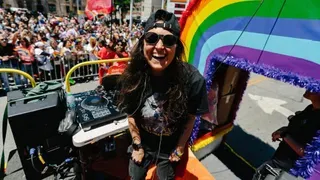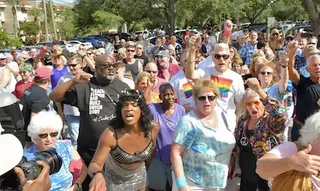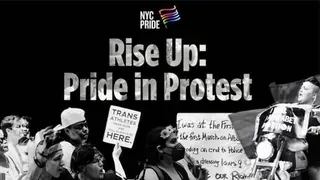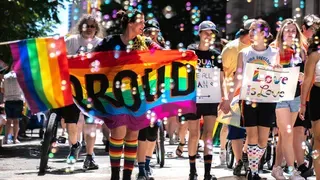July 11, 2011
Meredith Baxter: 'Untied' At Last
Tim Parks READ TIME: 10 MIN.
For seven seasons as Elyse Keaton on "Family Ties," Meredith Baxter exemplified a new breed of TV mom -- one that was vested in raising her fictional brood (Michael J. Fox, Justine Bateman and Tina Yothers) with a wider awareness and sophistication than June Cleaver ever had. Was Cleaver an architect and a mother? I don't think so... but Ms. Keaton was.
By that point in time -- 1982 -- Baxter was already a familiar face on television, largely due to being one half of the TV couple on "Bridget Loves Bernie" in 1972. Though critically acclaimed, the show just lasted only a single season. Still, for Baxter, its most lasting effect was that she married her co-star David Birney, a tumultuous marriage that ended in divorce in 1989. (It was her second of three marriages with men.)
Her name now hyphenated (Baxter-Birney), she went on to a featured role in 1976 on the acclaimed dramatic series "Family," where she played the eldest daughter to Sada Thompson and James Broderick, and older sibling to Gary Frank and Kristy McNichol.
"Family" went off the air in 1980, two years later Baxter-Birney joined "Family Ties," one of the most popular comedy franchises of the decade. On the show, Baxter-Birney and Michael Gross played Baby Boomer parents to children who embraced the conservative agenda of the Reagan era. Both working professionals (she an architect, he a station manager at a PBS station), the two were often at odds with their more politically and socially conservative children, most notably Young Republican Alex, played in a break-out performance by Michael J. Fox. The show -- so emblematic of the Reagan Years -- ended in 1989, the same year as the star's divorce from Birney.
Baxter dropped her hyphenated name, and began a return to her dramatic side with a wealth of made-for-TV movies, including "My Breast," "Kate's Secret," and two telepics based on the real-life murder trial of Betty Broderick in "A Woman Scorned: The Betty Broderick Story" and "Her Final Fury: Betty Broderick, the Last Chapter."
Her career went along at a steady clip, making the guest star rounds on "Spin City" with her former TV son, Michael J. Fox and even vocally reprised her most popular role on an episode of "Family Guy," as Elyse Keaton.
However, it was her personal life that would shine the pink spotlight on her in December of 2009, when she revealed to "Today Show" host Matt Lauer that she was a lesbian, and had been living with her partner Nancy Locke since 2005.
Since then, Baxter has immersed herself into being out and proud, including a slated turn as Grand Marshall of San Diego's LGBT Pride on July 16, and has even chronicled the experiences of opening up in her recent memoir, "Untied," published earlier this year.
The very affable Baxter spoke with EDGE about her fascinating career, if she would ever do a "Family Ties" reunion movie, and how the coming out process has been a case of the old adage, "Better late than never."
We Are Family
EDGE: "Family" was such a great show. Why don't we see it in more reruns?
Meredith Baxter: You know I'm not sure, but my guess is, and I may be wrong, it may not play well in reruns because the style was so different then; and, as a family drama, it played very slowly.
I have seen some reruns, and my little boy Timmy is in the hospital, and I walk into the hospital and there are no extras (laughs). And now you're used to seeing "Nurse Jackie," and there's a throng of people going everywhere and there's all sorts of extras, and on our show, this was like an empty hospital.
I don't think that they had the money, and it was a different kind of thinking, and the scenes played very slowly. There was a lot of time taken; it wasn't as natural as it is right now with having a lot of ambient noise, and a lot of stuff going on. If you were talking, you were only talking; you weren't talking and cooking.
EDGE: I was saddened to read about Sada Thompson's death -- since she was your TV mom, what was your impression of her?
Meredith Baxter: She was lovely and solid emotionally; she knew what she was doing really well. I found her a little formidable, so I was a little afraid of her, which is not a terrible thing because I really respected her.
In truth, whenever I did a scene with her, I was always sort of looking for her approval, and sometimes I'd get a nice little nod or a little wink, and sometimes I wouldn't get anything. So, it was like, oops.
EDGE: Do you still communicate with Kristy McNichol?
Meredith Baxter: No, you know, I'm not in touch with anybody else from the show.
Story continues on following page.
Watch Meredith Baxter come out on the "Today Show," December 2009:
A Real Family
EDGE: "Access Hollywood" put you in the Top Twenty TV Moms of all time for your role on "Family Ties." What do you think is your greatest legacy as a TV mom?
Meredith Baxter: First of all, I can't take that personally, because those weren't my words. I was just so honored to be able to say them. If anything, I think that people really connected to the fact that this looked like a family that really cared about each other.
And the truth was, we did. We had a lot of affection and respect, and a lot of great times, so many laughs. Every day we laughed ourselves all through the day. We were really fortunate that way. And I think that translated onto the screen: People could see our regard, and the fun that we had, and everyone comes from a family of some sort.
And we all have difficulties within our families, and here's how this family does it; this is how we get through our troubles, and that's what we want to see -- how do the people next door get through it?
You know something I always loved doing when I was young, out of the house around 17 or 18, I liked walking and looking in people's windows. I liked seeing what other people were thinking; I wanted to see interaction between families, because there was so little in mine that I was always looking to see people and what they would do.
And I think that's not unlike looking in someone's window with the show.
EDGE: If they ever did a reunion movie for "Family Ties," would you do it?
Meredith Baxter: No. And why? There's no upside for me to go back and say, "Here I am twenty years later, aren't you excited that I look so much older? Don't we all look so much different than when you saw us last time?"
Even now, I'll see pictures of myself and read the comments: "Oh! She looks like an old hag!" There's a real ugliness out there, a real ugliness, and the disenfranchised now have the anonymity of the Internet, and just to make snarky, nasty little comments from the privacy of their computers.
A Horrible Woman
EDGE: You have been in a number of well-received TV movies. Which one stands out the most for you?
Meredith Baxter: The first would probably most prominently be the two "Betty" movies, because what an incredible woman, just horrible (laughs). I really bought her story when we first prepared for the movie, and I read everything I could, all the press that was available about who Betty was, and what had happened, and what her reasons were, and her background.
So by the time we were filming the first one, I didn't agree with having killed two people, but I was pretty pro-Betty. And then, just as we were finishing up the first movie, she was on trial at the same time and we found out it was a hung jury. So we thought, we have another movie, because we were all sure that she was going to be convicted.
So when we did the second movie, there was enough time in between that I got to read the transcripts of the first trial, and found out that everything I had read in preparation for the first movie had been the result of her having a publicist while she was in jail.
And everything I read had been her spin on her story. She talked to everybody, so everybody took her information and plugged everyone else into it, so that was why all these women were like, "Oh, Betty."
I understand the dynamic, but it wasn't the real dynamic going on, because it left out what she was doing.
Coming Out...
EDGE: What has been the most surprising reaction to your coming out?
Meredith Baxter: The most surprising reaction has been how easy it's been -- not what I anticipated.
Now, I wasn't working a lot up to that, because I'm 63, the work is slowing down, and that was probably going to happen anyway.
I can't say that it has anything to do with coming out, but I haven't worked since.
EDGE: How does it feel for you to be out and proud?
Meredith Baxter: It's so much easier. I thought when the whole thing happened two years ago that I was gonna die, I wanted to drop through a hole in the ground, and I thought, "This is the worst thing I'm doing, it's like setting myself on fire on national television -- why am I doing this? Why do I have to do this?"
And Howard Bragman, who's my publicist, said, "You'll be so relieved afterwards." And I didn't believe it for a moment, I could not conceive of it.
When it was over, my partner Nancy and I walked out of NBC into the New York streets in a fine drizzle of rain, and it was like, "Well, that's done! I don't have to do that again."
And it's been fabulous. A lot of straight people come up to me and say, "I saw you on Oprah," which is now code for "I know you're out," and I love it. You know I have not been part of the gay community for that long, so I don't have a lot to compare that with; it's not what I expected. I didn't expect anyone to throw anything at me, but I didn't expect some people going out of their way to say, "It's great, I accept it, it's wonderful, congratulations."
I came to understand that what was important was for me and Nancy to be able to be on "Oprah" and sit there, two women holding hands, and I can say, "Yeah, this is my partner Nancy." And Nancy can say, "It was hard for me when she wasn't out." Because she was not going to change her lifestyle, she'd been out for thirty years.
And that's the kind of thing that people are saying, "So glad you're happy." And that's all they cared about.
EDGE: How cathartic was it for you to write your book "Untied?"
Meredith Baxter: I think I learned who I was by writing the book. It certainly gave me a lot of confidence that I had not had before.
But it helped crystallize what I knew, what I had learned, because it hadn't all come together in one place. There were different little pockets in my mind wrapped around different instances, but this really made sense when I could look at it as one piece.
Through my sobriety, I have come to an understanding about who I am, and if I had not been sober and in 12-Step Meetings, and if I hadn't heard people share with an incredible level of honesty, just unabashed [about] revealing shameful things, if I hadn't been witness to that, I could not have written this book. I wouldn't have had the courage to access to the stuff that I had to go write about.
A lot of stuff happened, a lot of bad stuff happened, and this was not just a book about this terrible marriage that I was in, and he did this, and he did this... No one's going to want to read that, and I didn't want to write that. It was really important for me to say, "How did I get here? What part did play in putting myself here? What was I telling myself to allow myself to stay here?" That's the stuff, that's the nitty gritty of the book.
Meredith Baxter will be appearing as co-Grand Marshall of the San Diego LGBT Pride Festival. The parade takes place on Saturday, July 16, 2011. For more details on the Festival, .
To learn more about Baxter's autobiography "Untied", visit
Watch this interview with Meredith Baxter from CBS's "The Talk":







